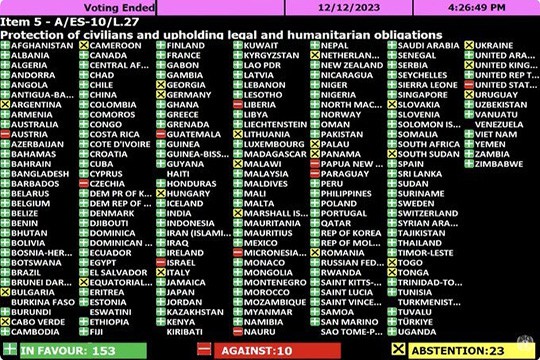The UN General Assembly has now voted on the resolution calling for an immediate ceasefire in the Israel/Gaza conflict which the United States vetoed in the Security Council.
The result: YES: 153; NO: 10; ABSTENTIONS: 23
Joining Israel and the United States in voting “no” were Austria, Czech Republic, Guatemala, Liberia, Micronesia, Nauru, Papua New Guinea and Paraguay.
The 23 abstainers were Argentina, Bulgaria, Cameroon, Cape Verde, Equatorial Guinea, Georgia, Germany, Hungary, Italy, Lithuania, Malawi, Marshall Islands, Netherlands, Palau, Panama, Romania, Slovakia, South Sudan, Togo, Tonga, Ukraine, United Kingdom and Uruguay.
It is noteworthy that only two European countries voted with Israel and the United States and that only eight members of the European Union abstained, which suggests that the unconditional support for Israel’s “right to defend itself” manifested in Europe until recently is starting to melt away. Indeed, even Ukraine abstained.
Also noteworthy is that no country in Asia other than Israel itself either voted “no” or abstained on this resolution, which suggests that the U.S. government’s hopes of enlisting loyal Asian support for confronting, containing and countering its perceived primary adversary, China, will not be easily achieved.
Even the Marshall Islands and Palau, two of the three (with Micronesia) “Freely Associated States” of the United States, quasi-colonies with U.S. Zip/postal codes, bound by their Compacts of Free Association to be guided by the United States in their foreign policies and usually faithful camp followers in filling out the minimal numbers of anti-Palestine votes on UN resolutions, dared to abstain in this vote. Even for them, some bridges of moral bankruptcy, inhumanity and depravity in American foreign policy are too far to cross.
This vote was held at an “emergency special session” of the General Assembly under the “Uniting for Peace” resolution, applicable when the Security Council fails to exercise its primary responsibility for international peace and security due to the veto of a permanent member, and there is precedent for such votes being deemed, like Security Council votes, legally binding (https://legal.un.org/avl/ha/ufp/ufp.html).
If there is anything left of international law and the UN system, the occupation of the entire territory of a UN member state by another UN member state, as in the case of Kuwait for seven months, cannot be permitted to persist indefinitely and without consequences, stresses John V. Whitbeck, a Paris-based international lawyer.
With global sympathy and support for Palestine and its people at an all-time high, Palestine has nothing to lose — and potentially a great deal to gain — from putting the United States to the test.
read more in our Telegram-channel https://t.me/The_International_Affairs

 11:40 15.12.2023 •
11:40 15.12.2023 •























